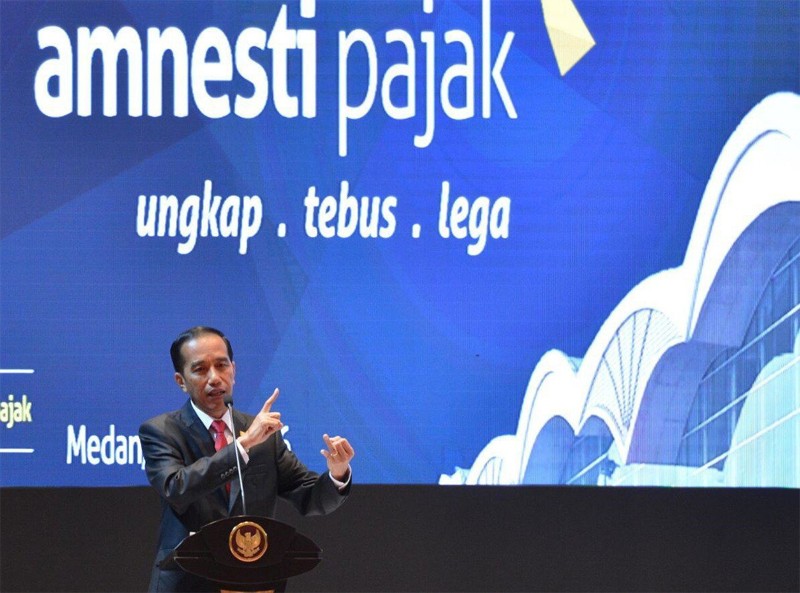First phase of amnesty ends on high note
Change Size
 President Joko "Jokowi" Widodo speaks during a campaign on tax amnesty program in Medan, North Sumatra on July 21. (Presidential Secretariat/Laily Rachev)
President Joko "Jokowi" Widodo speaks during a campaign on tax amnesty program in Medan, North Sumatra on July 21. (Presidential Secretariat/Laily Rachev)
T
he government concluded the first phase of its roller coaster tax amnesty ride with flying colors despite gloomy repatriation realization.
Tax officer Sigit Khamdani, 30, couldn’t wait for the long line of people at the Directorate General of Taxation’s headquarters to disperse on Friday.
It was the final day of the tax amnesty’s first phase and at least 2,750 people were queuing to apply for the tax pardon, higher than the 2,633 served the day before.
Sigit has had to sacrifice his weekends since August as the government sought to serve applicants seven days a week.
“It is tiring, but because we [tax officers] are doing it together, it feels fun,” he said. “When it [the first phase] is over, I want to hang out with my friends,” he added with a laugh.
Among those queueing on the final day was tax consultant Ego Kurnianto, who arrived at the tax office with his nine colleagues at 8 a.m. to submit their clients’ documents.
They even brought their own printer just in case they needed to print additional documents.
Even though Friday’s turnout was high, there were no crammed rooms such as were witnessed on Thursday, which forced the directorate general to announce an extraordinary situation at four tax offices, including at the tax office’s headquarters.
Super-long queues were seen occasionally, such as before officers began serving applicants in the morning. The tax office provided 1,300 seats and most of them were vacant by noon.
On the last day, the government could finally take a breather with the program’s first phase yielding higher-than-expected results after a slow start on July 18, as shown by several indicators.
The amount of declared assets reached Rp 3.59 quadrillion (US$276.12 billion) at 9:28 p.m. on Friday, equal to almost 90 percent of the Rp 4 quadrillion target.
Meanwhile, the penalty or redemption payments — which are expected to help cover this year’s state budget deficit — stood at Rp 88.5 trillion, more than half of the Rp 165 trillion target.
A not-so-rosy outcome was recorded in the amount of repatriated assets, which hovered at only Rp 136 trillion, a far cry from the Rp 1 quadrillion targeted.
During his visit to the headquarters on Friday evening, President Joko “Jokowi” Widodo reminded the public that two more phases of the program were still to come.
“There are still the second and third stages. Those who have not repatriated and declared their assets are welcome to make use of the program,” he said. The second phase will run from October to December and the last phase will run from January to March.
Jokowi refused to share the government’s plan going forward, only saying that he needed to discuss strategic measures with Finance Minister Sri Mulyani Indrawati.
Sri Mulyani expressed hope that the public’s enthusiasm would remain high in the next phases, despite the higher penalty rates.
Indonesian Employers Association (Apindo) chairman Hariyadi B. Sukamdani said the group had encouraged its members to repatriate their offshore assets under the program. “Asset repatriation takes a long time because the amount of assets is usually large,” he said.
Meanwhile, the fact that the repatriation rate of the offshore assets is low will no doubt be snatched upon by skeptics to argue that the program has not been a success, OCBC economist Wellian Wiranto wrote in a research note.
“We beg to differ, however. To begin with, there is a suspicion that some of the offshore assets might have been repatriated before the onset of the program, to avoid the three-year lock-up period,” he said.
Given that capital flow checks and controls would have been porous enough for the money to flow out to begin with, that is not an inconceivable possibility.
“We should not forget that, having been declared in black-and-white terms now, the still-offshore assets could eventually return in formal ways depending on the risk-reward calculations of the owners. Ultimately, given the dire state of global returns, the appeal of investments in Indonesia will stand out more and more in relative terms.”
__________________________________
To receive comprehensive and earlier access to The Jakarta Post print edition, please subscribe to our epaper through iOS' iTunes, Android's Google Play, Blackberry World or Microsoft's Windows Store. Subscription includes free daily editions of The Nation, The Star Malaysia, the Philippine Daily Inquirer and Asia News.
For print subscription, please contact our call center at (+6221) 5360014 or subscription@thejakartapost.com









